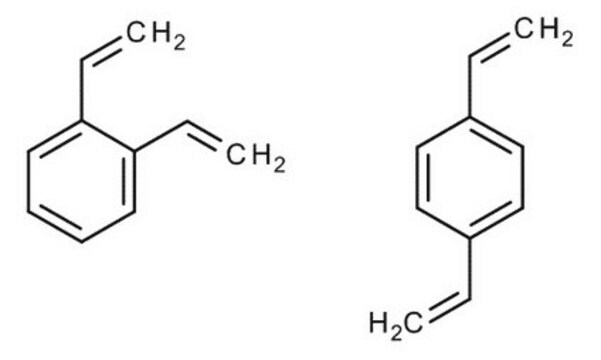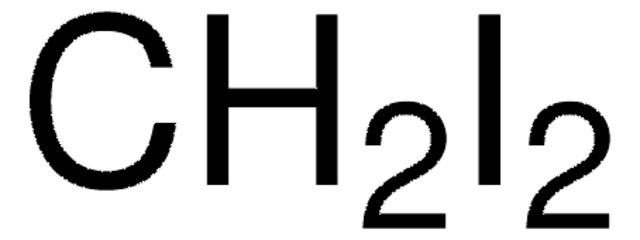414565
Divinylbenzene
technical grade, 80%
Synonym(s):
Diethenylbenzene
About This Item
Recommended Products
grade
technical grade
Quality Level
vapor density
4.5 (vs air)
vapor pressure
0.9 mmHg ( 30 °C)
Assay
80%
form
liquid
autoignition temp.
878 °F
contains
1000 ppm p-tert-butylcatechol as inhibitor
expl. lim.
0.7 %, 75 °F
6.5 %, 130 °F
refractive index
n20/D 1.561 (lit.)
bp
195 °C (lit.)
density
0.914 g/mL at 25 °C
storage temp.
2-8°C
SMILES string
C=Cc1ccc(C=C)cc1
InChI
1S/C10H10/c1-3-9-7-5-6-8-10(9)4-2/h3-8H,1-2H2
InChI key
MYRTYDVEIRVNKP-UHFFFAOYSA-N
Looking for similar products? Visit Product Comparison Guide
General description
Application
Signal Word
Warning
Hazard Statements
Precautionary Statements
Hazard Classifications
Aquatic Chronic 2 - Eye Irrit. 2 - Skin Irrit. 2 - Skin Sens. 1
Storage Class Code
10 - Combustible liquids
WGK
WGK 3
Flash Point(F)
147.2 °F - closed cup
Flash Point(C)
64 °C - closed cup
Personal Protective Equipment
Regulatory Listings
Regulatory Listings are mainly provided for chemical products. Only limited information can be provided here for non-chemical products. No entry means none of the components are listed. It is the user’s obligation to ensure the safe and legal use of the product.
FSL
Group 4: Flammable liquids
Type 2 petroleums
Hazardous rank III
Water insoluble liquid
ISHL Indicated Name
Substances Subject to be Indicated Names
ISHL Notified Names
Substances Subject to be Notified Names
JAN Code
414565-250ML:4548173940397
414565-BULK:
414565-1L:4548173940380
414565-VAR:
Choose from one of the most recent versions:
Already Own This Product?
Find documentation for the products that you have recently purchased in the Document Library.
Our team of scientists has experience in all areas of research including Life Science, Material Science, Chemical Synthesis, Chromatography, Analytical and many others.
Contact Technical Service










